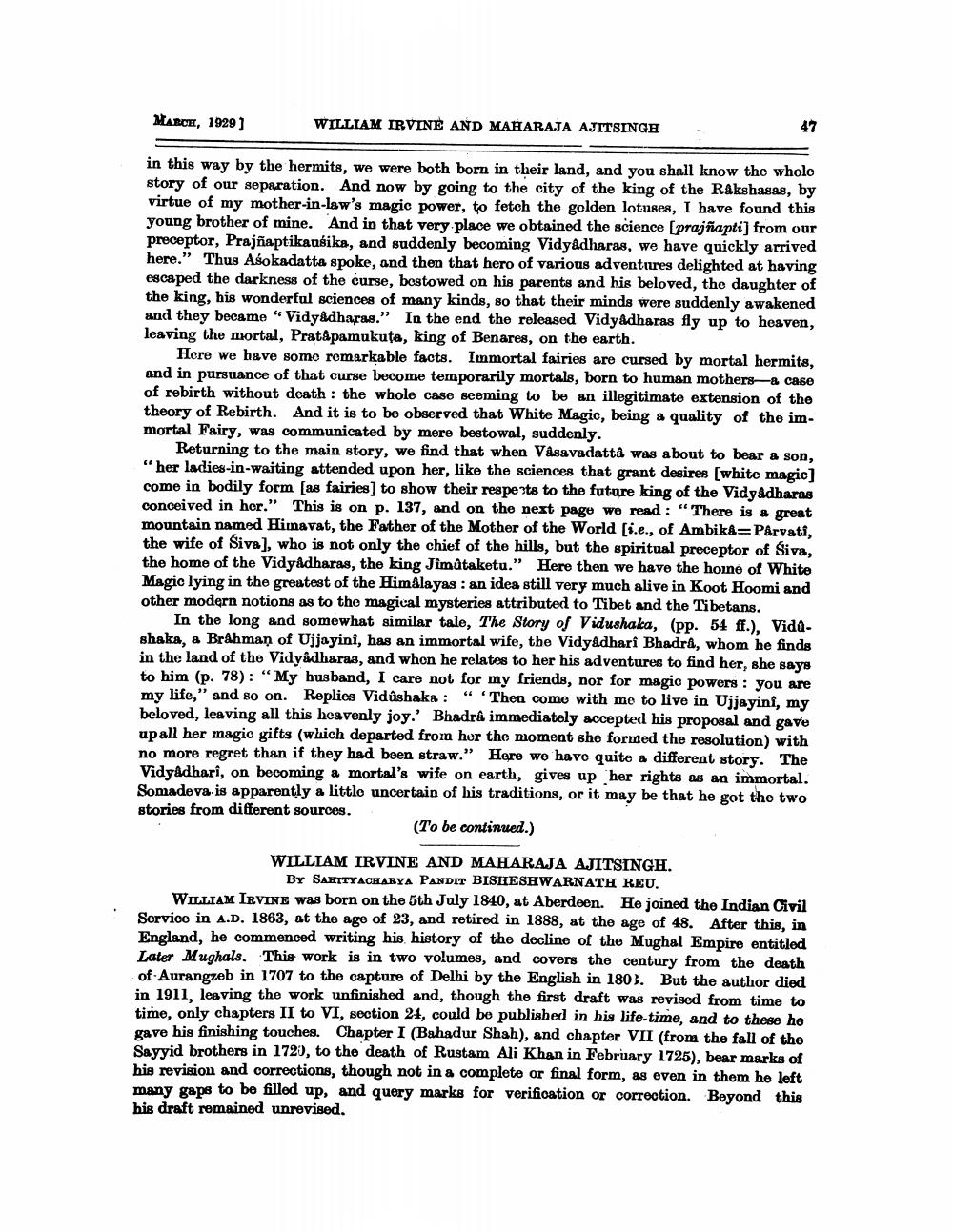________________
MARCH, 1929)
WILLIAM IRVINE AND MAHARAJA AJITSINGH
47
in this way by the hermits, we were both born in their land, and you shall know the whole story of our separation. And now by going to the city of the king of the Rakshasas, by virtue of my mother-in-law's magic power, to fetch the golden lotuses, I have found this young brother of mine. And in that very place we obtained the science (prajñapti) from our preceptor, Prajñaptikausika, and suddenly becoming Vidyadharas, we have quickly arrived here.” Thus Asokadatta spoke, and then that hero of various adventures delighted at having escaped the darkness of the curse, bestowed on his parents and his beloved, the daughter of the king, his wonderful sciences of many kinds, so that their minds were suddenly awakened and they became "Vidyadharas." In the end the released Vidyadharas fly up to heaven, leaving the mortal, Pratâ pamukuta, king of Benares, on the earth.
Here we have some remarkable facts. Immortal fairies are cursed by mortal hermits, and in pursuance of that curse become temporarily mortals, born to human mothers & case of rebirth without death : the whole case seeming to be an illegitimate extension of the theory of Rebirth. And it is to be observed that White Magic, being a quality of the immortal Fairy, was communicated by mere bestowal, suddenly.
Returning to the main story, we find that when Vasavadatta was about to bear a son, "her ladies-in-waiting attended upon her, like the sciences that grant desires (white magic] come in bodily form (as fairies) to show their respets to the future king of the Vidy Adharas conceived in her.” This is on p. 137, and on the next page we read: “There is a great mountain named Himavat, the Father of the Mother of the World [i.e., of Ambik&=Parvati, the wife of Sival, who is not only the chief of the hills, but the spiritual preceptor of Siva, the home of the Vidyadharas, the king Jimûtaketu." Here then we have the home of White Magic lying in the greatest of the Himalayas: an idea still very much alive in Koot Hoomi and other modern notions as to the magical mysteries attributed to Tibet and the Tibetans.
In the long and somewhat similar tale, The Story of Vidushaka, (pp. 54 ff.). Vidashaka, a Brahman of Ujjayini, has an immortal wife, the Vidyadhari Bhadra, whom he finds in the land of the Vidyadharas, and whon he relates to her his adventures to find her, she says to him (p. 78): "My husband, I care not for my friends, nor for magic powers : you are my life," and so on. Replies Vidůshaka : " Then come with me to live in Ujjayini, my beloved, leaving all this heavenly joy.' Bhadrâ immediately accepted his proposal and gave upall her magic gifts (which departed from her the moment she formed the resolution) with no more regret than if they had been straw." Here we have quite & different story. The Vidyadhari, on becoming a mortal's wife on earth, gives up her rights as an immortal. Somade va is apparently a little uncertain of his traditions, or it may be that he got the two stories from different sources.
(To be continued.)
WILLIAM IRVINE AND MAHARAJA AJITSINGH.
BY SAHITYACHARYA PANDIT BISHESHWARNATH REU. WILLIAM IRVINE was born on the 5th July 1840, at Aberdeen. He joined the Indian Civil Service in A.D. 1863, at the age of 23, and retired in 1888, at the age of 48. After this, in England, he commenced writing his history of the decline of the Mughal Empire entitled Later Mughals. This work is in two volumes, and covers the century from the death of Aurangzeb in 1707 to the capture of Delhi by the English in 180). But the author died in 1911, leaving the work unfinished and, though the first draft was revised from time to time, only chapters II to VI, section 24, could be published in his life-time, and to these he gave his finishing touches. Chapter I (Bahadur Shah), and chapter VII (from the fall of the Sayyid brothers in 1720, to the death of Rustam Ali Khan in February 1725), bear marks of his revision and corrections, though not in a complete or final form, as even in them he left many gaps to be filled up, and query marks for verification or correction. Beyond this his draft remained unrevised.




